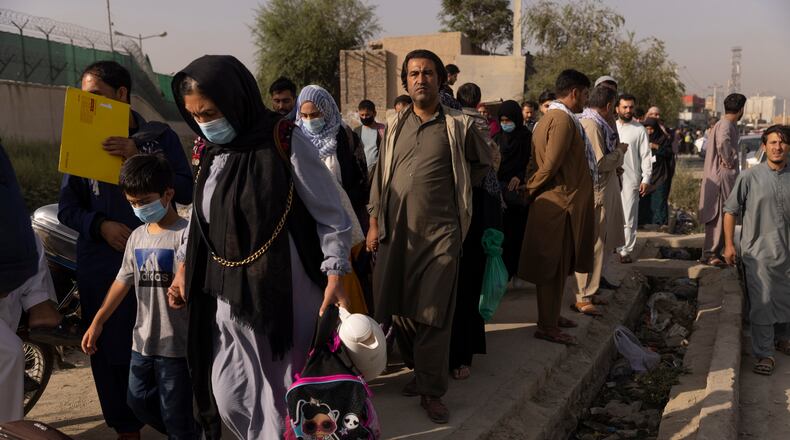As politicians begin debating the developing Afghan refugee crisis, resettlement organizations are focused on aiding a possible influx of families looking to start over in the United States.
The Biden administration is attempting to evacuate thousands of Afghans and their families who may be targeted by the Taliban. Among that group are translators and interpreters who worked with the U.S. military and government officials over the past two decades. Earlier this week a bipartisan group of senators urged the president to accelerate efforts to evacuate Afghans with Special Immigrant Visas in order to get them safely to the United States.
Justin Howell, the executive director of the International Rescue Committee in Atlanta, spoke to The Atlanta Journal-Constitution about the resettlement process and how the system works. The global humanitarian agency has been in operation in Atlanta for about 40 years and has a network of caseworkers and other professionals who assist people going through the resettlement process. It is one of the agencies that is likely to assist any Afghan refugees relocated here.
What is the Special Immigrant Visa program and what is the refugee resettlement program?
A Special Immigrant Visa program allows Iraqis and Afghans who have a documented history of working with the U.S. military or government as translators and interpreters to relocate to the United States, along with their immediate families, Howell said. Having an association with Americans can make SIV holders vulnerable to being targeted by the Taliban and put their safety at risk.
A refugee is defined as a person who flees their homeland due to fears of war, violence or persecution. Once safe in another country, they will register with the United Nations High Commissioner for Refugees, while staying at a refugee camp or a safe location within their new host country. The United Nations estimates there to be more than 26 million refugees in the world right now, and less than 1% of those people are resettled. Those who are chosen for resettlement, and permitted to come to the United States, quality for the refugee resettlement program. This is a part of a public-private partnership between that includes the United States government and resettlement organizations. These groups will help get refugees accustomed to life in the U.S. through educational programs and community-based support.
Are Afghans who come to the United States under the Special Immigrant Visa program given the same resettlement aid as refugees?
Yes. Once an Afghan SIV holder arrives stateside they are eligible for the same services as a refugee. The only difference between an SIV holder and refugee, from an aid standpoint, is the pathway in which they got to the United States.
Is there a vetting process in place for those being resettled in the United States?
Yes, the refugee resettlement process includes biometric screenings and security screenings with various government organizations including the military and FBI. Participants are also required to go through medical clearances and screenings. While overseas, refugees do not have a say in their relocation country; however, if they qualify to come to the United States agencies will attempt to resettle them near loved ones they have may in this country.
How about the airfare to come to the United States, who pays for the ticket?
The federal government requires anyone in the resettlement program to begin paying back their airfare fees six months of their arrival. This is because airplane tickets and other transportation fees are considered a loan by the government.
What are some of the services refugees and SIV holders can expect when they arrive to the U.S.?
The International Rescue Committee is one of several agencies working with these groups, and it provides a safe place for them to live, furnishes it, and stocks the pantry with culturally appropriate food. They also get picked up from the airport, and given a hot meal once they make it to their new homes, Howell said. They’re also given a quick orientation about the program and expectations. Within the first 10 days of their arrival, refugees and SIV holders will receive a medical screening. Aid organizations will also help with basic needs such as enrolling children in school, providing adults access to language-classes, job training and employment support, such as resume development.
Another local group, the Refugee Women’s Network, is fundraising to help new Afghan arrivals resettle in the Atlanta area. The RWN was created about 25 years ago with the purpose of aiding refugee and immigrant families in Georgia. Donations are used to purchase basic goods such as clothing, kitchen supplies and food, along with providing social services, said Marjan Nadir, an economic empowerment manager with the group.
How long does it take for the typical new arrivals to able to become self-sufficient?
Howell said about 90% of the families and individuals his office serves are fully self-sufficient within six months of their arrival. Although they’re welcome to continue a relationship with the IRC in Atlanta for support, such as help meeting educational goals.
Is there a pathway to citizenship for people who come to the United States on SIV or through the standard refugee resettlement program?
Anyone who comes to the country as an SIV holder or through refugee resettlement is on a full pathway to citizenship the minute they land stateside, Howell said. They are also eligible to work and pay taxes from the moment they arrive.
Paradise Afshar is a Report for America corps member covering metro Atlanta’s immigrant communities.
About the Author
Keep Reading
The Latest
Featured



